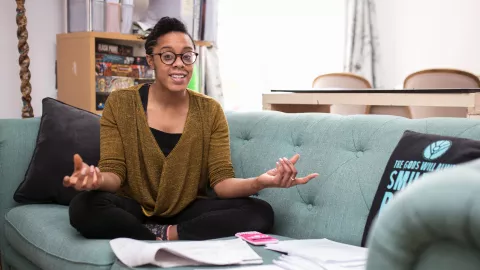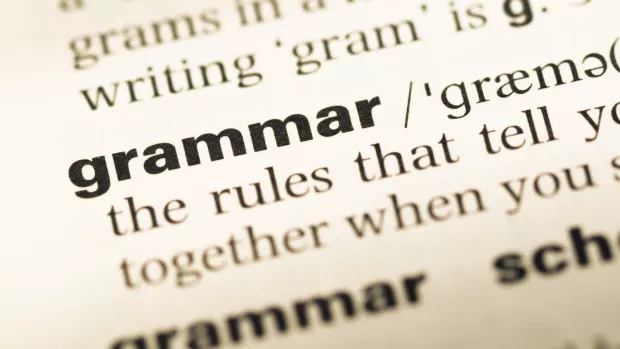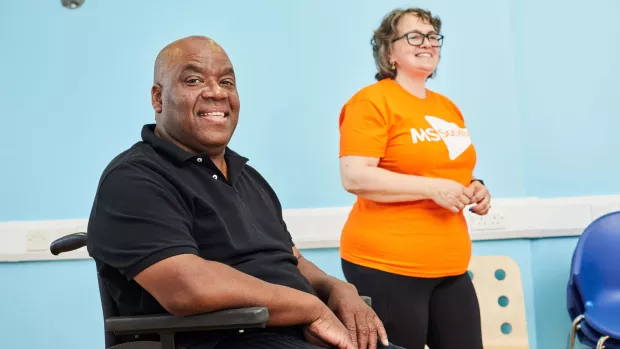
Talking about MS and our work
Here we cover how we talk about our work and our community using plain English and inclusive language.
Accessibility and plain English
We want everyone to be able to understand what we write, so we use plain English. That means:
- getting to the point quickly
- using short sentences (average sentence length of 12 words. Avoid sentences longer than 21 words)
- exploring one idea a paragraph
- adding subheadings (helps with context and memory)
- using common words instead of unusual or complicated ones
- using the active tense over the passive tense wherever we can. For example ‘We processed your application’ instead of ‘Your application was processed’.
You can read more about plain English on the Plain English Campaign website.
And use the Hemmingway App to check your writing. It's a public platform so don't paste in anything private!
How we talk about MS
Multiple sclerosis
- We usually use the abbreviation MS. When we write it out in full, we spell MS without capitals: multiple sclerosis
- We don't use capitals for the different types of MS. For example 'relapsing remitting MS' and 'secondary progressive MS'
- We don’t use abbreviations like pwMS (‘person with MS’)
- When we talk about a person’s MS, we use the word condition not disease. If someone is keen to describe their MS as a disease, we could use their words as part of a quote
- When research or medical terms use the word disease within them we do too. For example ‘disease progression’ or ‘disease modifying therapy (DMT)’
- We describe people with MS as ‘living with MS’. We don’t talk about ‘MS sufferers’ or people who ‘suffer with MS’ (unless the person with MS is keen to use the phrase to describe themselves in a quote or their own writing.)
- When we’re talking about people with MS and their friends and families, we say ‘people affected by MS’
- We know some people who care for people with MS don’t identify as carers. And that can be a barrier to them knowing what support they can get. We talk about ‘people who care for someone with MS’, or ‘Friends, family and carers’.
Disability
People with MS automatically meet the disability definition under the Equality Act 2010 from the day they’re diagnosed. But many people with MS don’t see themselves as disabled, particularly if they don’t have advanced symptoms. So we often talk about specific symptoms rather than general disability. For example we’d say “Mike has problems with walking and balance so uses a wheelchair” rather than “Mike’s disability means he’s confined to a wheelchair”.
Words and phrases we don’t use include: ‘the disabled’, ‘suffering from a disability’, ‘handicapped/handicap’, ‘wheelchair-bound’, 'bed-bound’ or ‘sufferer’.
Social model of disability
We follow the social model of disability. It says that people are disabled by barriers in society, not by their medical condition. So when we talk about disability we refer to people as ‘disabled’ rather than ‘having disabilities’.
We respect how people with MS want to self describe. So if someone says they have disabilities rather than impairments, that’s their choice in their own words or writing.
Read about the social model of disability on Scope's website
We use Plain English to make sure our language doesn’t disable our audiences.
How we talk about ethnicity
We capitalise ethnicities like Black, White, Asian and Traveller. We respect how people want to describe themselves. But avoid adjectives like BAME or phrases like people of colour when writing as the MS Society.
Find research on writing about ethnicity in the Gov.UK style guide
How we talk about our work
- We always say ‘we’, or ‘us’ wherever we can. So instead of saying ‘The MS Society has launched a new campaign’, we’d say ‘We launched a new campaign’.
- We never refer to ourselves as 'the Society' or MSS.
- We rarely refer to ourselves as the Multiple Sclerosis Society except on legal documents – our brand is MS Society.
See examples of how we talk
Describing ourselves to a cold audience
Describing ourselves to a warm audience
Talking about our UK-wide mission
Describing ourselves to a cold audience
Over 130,000 people in the UK have multiple sclerosis (MS). It’s unpredictable, and different for everyone. It’s often painful and exhausting, and can cause problems with how we walk, move, see, think and feel. But it doesn’t have to be this way.
We fund world-leading scientists as they search for new treatments. We make sure everyone can access expert information and services to help them live well with MS. We speak up together, to make sure everyone’s voice is heard and rights are protected. We support one another when times are tough and celebrate together when they are good. We make sure no one has to feel alone.
Together we are a community of people living with MS, friends, families, carers, scientists, researchers, healthcare professionals, campaigners and volunteers. We’re here for anyone who wants to join us. And together we will stop MS.
Describing ourselves to a warm audience
[short]
We’re the MS Society and we’re here for you. Funding world-leading research, sharing information, making voices heard and campaigning for everyone’s rights.
Together we are a community. And together we will stop MS.
[medium]
We’re the MS Society. We’re here by your side through the highs, lows and
everything in between.
Together we fund world-leading research. We provide information and services so everyone can live well with MS. We make our voices heard and campaign for everyone’s rights. And we support one another so no one has to feel alone. Together we are a community. And together we will stop MS.
[long]
We’re the MS Society. We’re here by your side through the highs, lows
and everything in between. We fund world-leading scientists as they search for new treatments. We make sure everyone can access expert information and services to help them live well with MS. We speak up together, to make sure everyone’s voice is heard and rights are protected. We support one another when times are tough and celebrate together when they are good. We make sure no one has to feel alone.
Together we are a community of people living with MS, friends, families, carers, scientists, researchers, healthcare professionals, campaigners, and volunteers. We’re here for anyone who wants to join us. And together we will stop MS.
Our MS Helpline
We always talk about (our) MS Helpline, never the helpline or the Helpline. That’s to distinguish ourselves from other MS charities’ helplines.
Our forum
Our forum is a welcoming online space for everyone affected by MS to chat about whatever they want. In the past, we’ve called it a community space or our online forum. But our users have told us they know it simply as the forum so that’s what we call it.
Our UK-wide mission
We work across all four nations of the UK. So we make sure we’re clear what part of updates about things like new legislation or drugs apply where.
We name nations that decisions don’t affect, as well as the ones they do. For example, ‘In England and Wales, a new law might affect your care services. At the moment, nothing similar affects services in Scotland and Northern Ireland.’
When something is UK wide, we can make our copy feel more inclusive by emphasising ‘UK’.
Our campaigns and appeals
Access to treatments (Treat Me Right)
We want people with MS to get the right treatment at the right time. People with MS should have fair and equal access to treatments wherever they live.
Accessing services (Neurology Now)
Everyone with MS should have access to the health services they need to best manage their MS. Neurology and wider services have been stretched, underfunded and overlooked for years. This can’t continue.
Benefits (MS Enough)
Having MS is hard enough. It shouldn’t be made harder by a welfare system that doesn’t make sense. We need a welfare system that understand MS and ensures people with MS have sufficient financial support to cover the extra costs of the condition and live with dignity.
Employment (MS Enough)
Most people with MS start experiencing symptoms during the peak of their working lives, and 80% retire within 15 years of their diagnosis. We need an employment system that better supports people with MS find, move into, stay in and move out of work.
Social care (Care and Support)
The social care system in England is in crisis. It’s failing to deliver the quality care that people of all ages affected by MS rely on to live independently. Too often people with MS can’t get the support they need to stay active and independent. We need a social care system that works for people with MS.
Local campaigning (Local Action for MS)
We’re stronger when we campaign together. Through our Local Action for MS programme we empower people with MS to lead their own campaigns and create change in their local area through resources, support and training.
Stop MS Appeal
With the discoveries being made right now, we believe treatments that slow or stop disability progression for everyone with MS are a very real prospect. Our Stop MS Appeal is raising £100 million to fund this research, and we’re already over half way to our target. Research has got us to a critical point and we want a future where no-one has to worry about their MS getting worse. But we can’t do it without your support.
[We don’t capitalise stop MS in a sentence unless we’re using the full appeal name: Stop MS Appeal]



